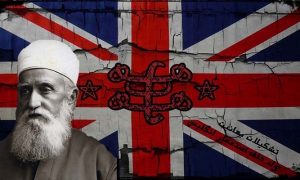One of the signs of the Baha’i masters’ submission to the Colonial governments, is their flattery and request for direct intervention in the countries affairs by supporting this cult. Consequently, the clear example of this behavior can be observed in Abdul Baha’s flattering request of England for opening Baha’ism proselytizing place in Kashan city.
After Vahdat school in Kashan city was cancelled and the Baha’is couldn’t reopen it, the national assembly of the Iranian Baha’is sent a report to Abdul Baha. Abdul Baha telegraphed the British ambassador directly and asked flatteringly for reopening the school through direct intervention of the British government: “Strengthen this oppressed party who is benevolent for the dignified government and has repeatedly praised the British justice ordered by Bahaullah. All Baha’is are honest companions of the great government. Abbas Abdul Baha.[1]”
In this way; in addition to indicating deep bond between himself and his followers and the British government, Abdul Baha asked formally for the British intervention in the Iranian domestic affairs and supporting the proselytizing activities of Baha’ism. While considering the Colonial activities of England in Iran, the measure of the Baha’ism leader was in fact an anti-national approach which was in contrary to the independence of the divine religions of the tyrant powers.
Since the emergence of Babism cult, it was dependent on the Colonial government of czar Russia. Later on during Hussein Ali Nouri period of time and after a short time the czar supporters of the deviant movement was delivered to the British government. After the establishment of the Baha’ism organization in Israel, this cult was in hands of the Zionistic regime as a means against the Iranian nation.
[۱] Seyyed Baqer Najafi, the Baha’is, Tehran: Ma’shar publishing house, 1383 S.H., p. 648.






